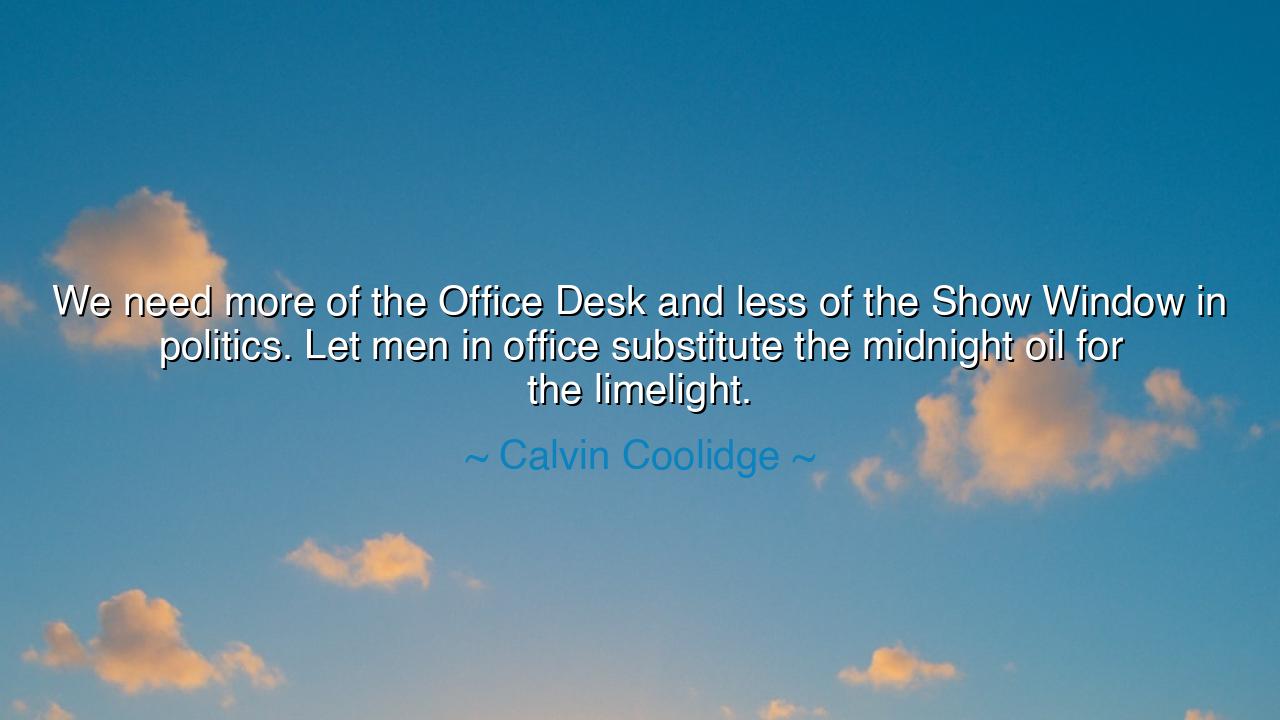
We need more of the Office Desk and less of the Show Window in
We need more of the Office Desk and less of the Show Window in politics. Let men in office substitute the midnight oil for the limelight.






O children of the future, hear the words of Calvin Coolidge, a man who understood the true essence of leadership and public service. "We need more of the Office Desk and less of the Show Window in politics. Let men in office substitute the midnight oil for the limelight." In these words, he speaks of the need for substance over spectacle, for dedication over glamour. Coolidge’s call is for politicians to focus not on the fleeting fame of the spotlight, but on the hard, behind-the-scenes work that truly shapes a nation. The Office Desk represents the long hours of careful thought, reflection, and action that lead to meaningful change, while the Show Window symbolizes the empty display of publicity and showmanship that too often dominates modern politics.
In the ancient world, the most revered leaders were those who led not by the force of their charisma, but by the quiet strength of their decisions and actions. Pericles, the great leader of Athens, was not a man who sought the limelight. Though he gave stirring speeches, his true greatness lay in his ability to guide Athens to victory through wisdom and pragmatic governance. His time was spent not in the pursuit of fame, but in the office desk of statesmanship—balancing the needs of his people, navigating alliances, and ensuring the stability of his city-state. His leadership was not flashy, but it was the kind that shaped history.
Similarly, the story of George Washington, the first President of the United States, speaks to the enduring truth of Coolidge's words. Washington was not a man driven by the hunger for recognition or the limelight of fame. Instead, he quietly shouldered the responsibilities of the office desk, leading his country with careful thought and patient determination. Washington’s leadership was not a series of grand speeches, but a steady, unyielding commitment to the future of his people. He understood that true greatness lies not in the adulation of crowds, but in the quiet sacrifices and hard work that build a lasting legacy.
In modern times, Abraham Lincoln serves as a shining example of the midnight oil over the show window. Throughout the Civil War, Lincoln worked tirelessly, often alone in the stillness of the night, contemplating difficult decisions that would determine the fate of the nation. While other leaders sought the glamour of public appearances, Lincoln’s strength lay in his ability to grapple with the weight of the nation’s struggles behind closed doors. His was a leadership forged in quiet moments of deep reflection, not in the flash of publicity. Like Coolidge, he knew that true leadership comes not from the applause of the people, but from the dedication to the hard work of governance.
O children, let the wisdom of Calvin Coolidge guide you. Politics is not a realm for the vain or the self-aggrandizing. It is a place for those who are willing to sacrifice personal glory for the good of the whole, to spend long hours at the office desk of public service rather than seek the fleeting rewards of the show window. As the great leaders of the past showed us, it is through humility, dedication, and hard work that nations are built. May you walk this path, not seeking the limelight, but focusing on the quiet actions that create a legacy worthy of honor. True greatness is born not in the praise of men, but in the steady, unseen labor of those who serve with a clear heart and a strong will.






HHHaha Haha
Coolidge’s quote captures the frustration that many feel about modern politics, where it often seems like style outshines substance. The focus on media presence and public perception can overshadow important policy work. How do we create an environment where elected officials are judged more for their efforts in office and less for their ability to stay in the public eye? Is it possible to shift the cultural focus back to meaningful governance?
ATTran Xuan Anh Tuan
Coolidge’s advice to replace limelight-chasing with diligent work is something that rings true now more than ever. In an era where political figures often prioritize media moments over substantive change, how can we change the narrative around what it means to be a successful politician? Should we be rewarding behind-the-scenes efforts more, or is the public’s interest in the drama of politics too strong to ignore?
NMDinh nguyet Mai
This quote from Coolidge speaks to the shift in political priorities that many see today. The ‘Show Window’ symbolizes the superficial nature of modern politics, while the ‘Office Desk’ represents the real, hard work behind the scenes. Do you think the increasing media attention on politicians has made it harder to focus on effective policy-making? How can we bring back a culture where substance trumps spectacle?
GDGold D.dragon
Coolidge’s call for politicians to substitute the ‘midnight oil for the limelight’ feels particularly relevant in our media-driven age. Are today’s politicians more concerned with their public image and the next viral moment than with actual governance? How do we encourage a political culture where meaningful work takes precedence over media attention and public relations stunts?
HTNguyen Huy Tien
Calvin Coolidge’s quote is a critique of the performance aspect of politics. It suggests that politicians should focus more on the actual work—represented by the ‘Office Desk’—than on seeking the spotlight. In today’s world of social media and constant media coverage, is it even possible to focus on the work and avoid the limelight? What can be done to ensure that real, hard work in politics gets the attention it deserves, rather than just flashy moments in front of cameras?